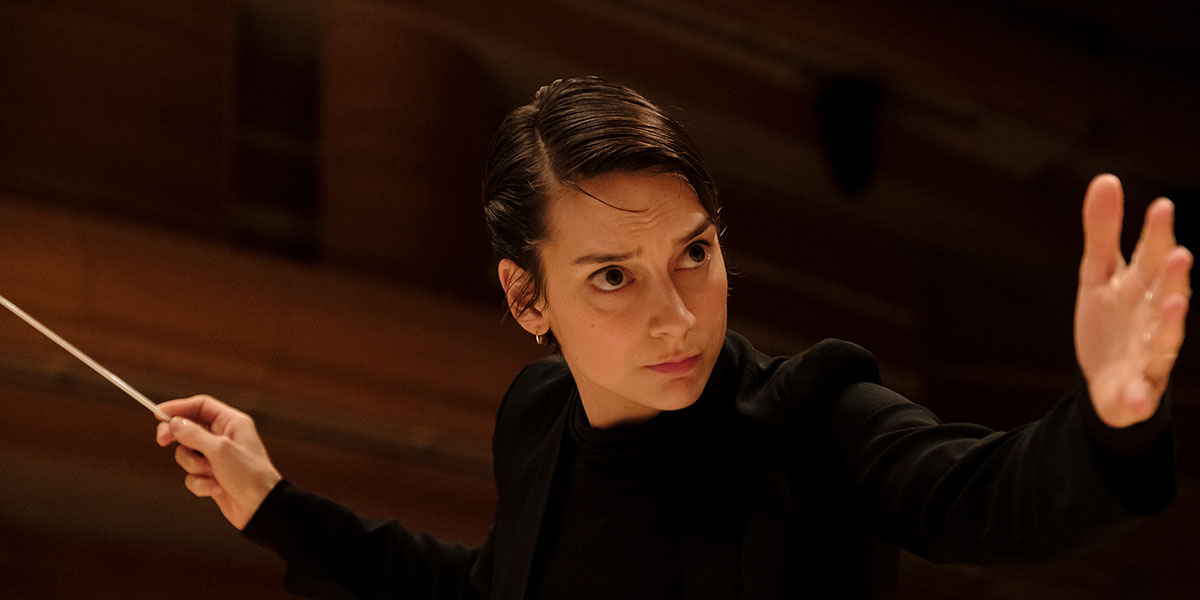In the opening scene of “Tár,” the title character memorably describes conducting music as an act of control, an art that turns the orchestra into her vessels and gives her power to start and stop time itself. If Todd Field’s epic doesn’t necessarily agree with this narcissistic vision of artistic collaboration, it certainly verbalizes the popular public image of the conductor, so often depicted as an domineering perfectionist that lords over their orchestras, composed and commanding.
As an intimate character study of a lesbian conductor featuring the symphonies of Gustav Mahler, “Days of Happiness” is destined to receive even more comparisons to “Tár” than other movies set in the insular and intense classical music field. But the Canadian film‘s protagonist Emma (Sophie Desmarais) couldn’t be more different from Cate Blanchett’s titanic Lydia.
A prodigious rising star in Quebec’s classic music scene, Emma certainly strives to fit the mold of the poised, unflappable maestro, but there’s a certain awkwardness to her that constantly punctures the image. In the amusing opening sequence, she dozes off on a cushion that slowly drifts out to water at a lakeside resort, and is forced to sheepishly admit she can’t swim to the onlooking staff. Petite in a crumpled white shirt and occasionally using a pencil as a baton during rehearsal, she frequently resembles a teenager playing the part of a conductor rather than the genuine article, her clumsy and unformed conducting technique miles away from the graceful style Tár uses to command her musicians. If Lydia Tár is a woman with an all-encompassing control over the people around her, Emma is a woman defined by her complete lack of control over her own life.
In writer-director Chloé Robichaud’s depiction of the classical music community, conductors like Emma may be leaders of their orchestras, but the actual power belongs in the hands of the institutions who hire them, the backers and programmers Emma is constantly attempting to impress. Most importantly, the power belongs to her father Patrick (Sylvain Marcel), who works as her agent and is pushing for her to find a new gig as her current residency comes to a close. Patrick insists that he treats Emma no different than his other clients, but he proves both overbearingly precious with her — he’s introduced embarrassing her at lunch by asking a waiter to lower the volume of the restaurant’s music for her — and, in the moments when Emma doesn’t achieve complete perfection, terrifyingly harsh. Gradually, the emotionally abusive nature of their relationship grows more obvious, and Emma’s attempts to define her life and career outside of him becomes the movie’s primary journey.

Before “Days of Happiness,” Desmarais starred in Robichaud’s 2013 feature debut “Sarah Prefers to Run,” which was similarly about a talented young woman juggling her dedication to her calling (in that case, track and field) with a complicated and messy personal life. As written by Robichaud and performed by Desmarais, Emma is anxious and sensitive, years of strict tutelage from her father manifesting in a gaping void of self-worth and and inability to handle feedback that isn’t unqualified praise. Desmarais, with a set of expressive wide eyes, proves adapt at communicating those layers onscreen; she brings a compelling desperation and slight childish quality to the moments where Emma unleashes her anger, but is most riveting when putting on a confident face for her orchestra or symphony patrons, the hesitance in her voice and tiny shifts on her face betraying an inner turmoil.
As she struggles with the pressures of preparing a new symphony performance, Emma’s emotional repression is reflected by the music she creates. Early on, an experienced maestro Phillipe (Vincent Leclerc) that she seeks out for advice compliments her technical skill but bluntly tells her that her work lacks passion. “If you want to stir emotions, make me feel the music, you have to feel those things as well,” he tells her. For Emma though, burying herself in music helps her avoid feeling anything; when her grandmother dies unexpectedly, and her mother Sabrina (Maude Guérin, memorable as a brittle enabler) informs her that she and her father have kept her grandfather’s death hidden from her for months so she can concentrate on her career, she retreats to playing the family piano to avoid confronting the two directly.
While making the film, Robichaud brought on Yannick Nézet-Séguin, music director of the real-life Orchestre Métropolitain, as a consultant, and the compositions in the film were performed by actual symphony members, helping create a grounding sense of accuracy. A standout sequence follows Emma’s performance of a composition from Arnold Schoenberg, chosen because of the work’s darkness and passion, in the middle of an emotional breakdown. Every element of the scene — Robichaud’s direction, the sharp editing from Yvann Thibaudeau, the slightly off performances from the musicians, and the growing panic on Desmarais’ face — helps sell the performance as a disaster even to those with limited classical music knowledge, creating an unbearable sense of tension.
As compelling a character as Emma is, and as shrewdly as Desmarais plays her, the film struggles somewhat to find depth outside of its protagonist. Patrick is a believably hard-to-spot manipulator, showing enough affection to Emma to mask the way he torments her, and Marcel and Desmarais share a charged and complicated chemistry that conveys years of tension and unspoken resentment. But the movie’s efforts to shade-in and explain Patrick’s behavior, through a few references to a history of abuse with his own parents, feels unnecessary and actively detrimental, coming across as a “hurt people hurt people” cliché more than something that genuinely informs his current day treatment of his daughter. The movie on a whole starts strong but begins to run out of momentum at the end as it struggles to convincingly portray how Emma breaks away from Patrick; a climactic performance juxtaposed with a montage of Emma’s childhood lands for catharsis but falls flat, feeling far too sappy and rote for a story that previously had so much nuance and restraint.
The film also struggles with the time it spends outside its central toxic dynamic. As the story opens, Emma is in the early stages of dating Naëlle (Nour Belkhiria), a cellist in her symphony. The romance is strained from the jump; Naëlle, a mother recently separated from her son’s father, skips out on meeting Emma’s friends constantly, and hesitates to let Emma meet her kid, while Emma lets her family drama pour into their relationship. In theory, Naëlle is the main impetus for Emma to reevaluate her life, but their connection never fully comes alive. That’s partly because Naëlle, despite Belkhiria’s warm screen presence, doesn’t transcend the single note that the script gives her. Her issues with her former partner and her life as a young mother feel shallow and sketched-in, and Emma’s scenes with her feel unfortunately vestigial.
“Days of Happiness” excels in creating a protagonist with a fascinating inner life, even if it doesn’t fully stick the landing in convincingly dramatizing her journey. Desmarais’ strong work still makes it a worthwhile, often riveting character study. It’s perhaps fitting that a movie about an artist still struggling to reach her full potential isn’t an unqualified success itself.
Grade: B
“Days of Happiness” premiered at the 2023 Toronto International Film Festival. It is currently seeking U.S. distribution.





